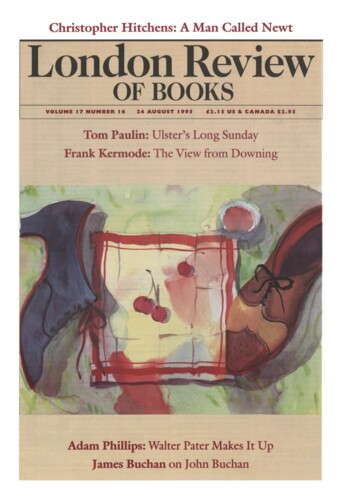The lnfibulation Ceremony
We have reached the limit of poetry: Western people’s ignorance of how their own cultures are viewed by integrationist Islam is too profound. The following poem could never be read in illiterate deserts. Like Alice Walker and Pratibha Parmar working in West Africa, you could make a courageous film on the subject of infibulation. Failing that, a poem might yet become a sort of film shot from a distance, an attempt to project onto the air, via a beam of good wishes, an imagined ceremony for the sake of young girls who are infibulated without ceremony by nomad Somalis, almost on the move.
A Jeep, its shock absorbers gone, thumps
across pocks in the level desert scrub
faster than the black-faced sheep with fat tails
prodded onwards by the nomad women.
If we have time and water
we stop and let the clan drink;
if we have neither we drive on
inventing our film about infibulation.
We drive up to a low escarpment
and look down on a hollow littered with people,
livestock scattered among the rocky slopes
by a well cairned with boulders.
Near this home well on their April journey
the women dismantle the hut sticks
from the ship slew of camel humps,
setting up nissen huts of mats and skins.
Herded then by a man, disburdened
camels sigh and settle down
in the rubbled hollow of the home well
in the northern Somali Republic.
Off to the side – we swivel the camera –
where thorns are piled for the fence
the nomads are busy at their camp
fastening the huts with bark ropes.
One little hut that’s new
arrived on the coarse grass from the sky.
It’s the virgin spirit placed there somehow,
dazzling the nomads with the sunshine on it.
They sew up its door flaps with the ropes
so no man may crawl through
a tiny slit left at the bottom
like a Western shirt missing a button.
Then on dry highlands of Somalia
we set their young girls to go dancing
in virginity round the sutured hut:
this is their sorrow in private places.
They dance in a hurt, stiff motion,
stick-legged as if avoiding stones
blood gleaming on brown thighs
tears in expressionless eyes.
The mouths of these children are silenced
by tradition: that they be made clean,
that they not become promiscuous,
that they be desirable for marriage
with a sewn vagina, stripped of pleasure,
crossed with thorns, as if the surgeons
had sutured the mouth of a healthy baby
leaving the palette uselessly cleft.
But this film is fantasy imagined from books
and my inability to suffer the thorns
that make religions stand erect, or that make
a temple’s entrance so narrow.
We shoot the girls from a distance, telephoto,
forgetting the funds we raised in Britain,
forgetting the clan-lords warring in Mogadishu,
forgetting the entrenchment of Islam
into hard-line law, here called Shaft’i;
while the West threatens Islam with bombs
or rich products bearing our labels,
may our Jeeps not insult their culture.
We know these illiterates will never see our film;
so will the children make their children dance
that queer dance in this cinema-wilderness?
Our Jeep moves on, its tracks soon blown over.
The film is more penetrant than propaganda;
for it shows the silence here;
and the thorny look in the girls’ eyes;
it shows the male wind, harsh, hot.
A Woman in Ethiopa
Through the telescope’s smoking lens
I see a woman rising in her heat of limbs
from the red desert of Ethiopia;
a priest above her holds a cross
and reads from a dark book: she doesn’t
think of me though I think of her intently
and watch the bitter smoke of her sweet fires
making haze round a claystack chimney lodged
in thatch on her circular house of stones.
I speak her country’s name but my blazed trail
gives out in this interior. The woman’s mood
remains mysterious as she rises. If it’s joy,
it has nothing to say but ‘Join us’; but I can’t
walk beside her child (wearing a Baltimore
Orioles ’cheater) across old battlegrounds
to the well. He secretes a social closeness
born in the swift mood below the rib-cage,
behind the forehead, under the swollen belly.
Often the insubstantial passing thing
counts – myself at a dance passing by my former
lover’s dress now topped by a baseball jacket –
deserts spread in certain of my memories,
trivial compared with these red hills of Ethiopia
eroded by farm failures of the dispossessed,
coniferous forest of zigba and tid, disappeared,
coffee bush brittle twigged, cattle bony
on the shoulder, malaria in the lower plains.
I’ve spoken the country, can’t count its secret joy,
interior of stones mottled with cooking tar,
misted by cobwebs, a woman rising
in her heat, walking towards the inner place
of celebration, the wrested feet of a pullet
no longer dusty, bones thrown into leaden water,
some joyful mood my melancholy can’t infect;
there’s bubbling within the door shadows
for the unnamed occasion. Shame’s my borderline,
since, however far I go, I won’t get hungrier,
and poverty has stages I shall never know.
They tie the gut in ivory knots; a little boy
can only waddle with his belly or a girl
lying in mama’s arms hurl all her heart
into her yelling. The tourists curve out of these
deserts and emerge on blinding shores,
where eyesight swivels, dragging sheets of light
too sparkling to match our own dull hearts to.
A woman rises from a stool this morning/night.
Send Letters To:
The Editor
London Review of Books,
28 Little Russell Street
London, WC1A 2HN
letters@lrb.co.uk
Please include name, address, and a telephone number.

